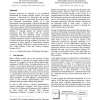60 search results - page 4 / 12 » Information Hiding in Finite State Machine |
134
click to vote
ACSW
2004
15 years 3 months ago
2004
Software protection via obscurity is now considered fundamental for securing software systems. This paper proposes a framework for obfuscating the program interpretation instead o...
IHM
2004
ACM
15 years 7 months ago
2004
ACM
Although coupling interaction resources is key to ubiquitous computing, this notion has been overlooked in previous studies. In this paper, we address this notion in a more system...
102
click to vote
ADC
2004
Springer
15 years 7 months ago
2004
Springer
Workflow technology has met with success in a variety of industries, although several limitations have emerged. One such drawback is the inflexibility of specification languages, ...
107
click to vote
ISCIS
2009
Springer
15 years 8 months ago
2009
Springer
—Methods for software testing based on Finite State Machines (FSMs) have been researched since the early 60’s. Many of these methods are about generating a checking sequence fr...
145
Voted
ISLPED
1997
ACM
15 years 5 months ago
1997
ACM
- The objective of this paper is to provide an effective technique for accurate modeling of the external input sequences that affect the behavior of Finite State Machines (FSMs). B...

